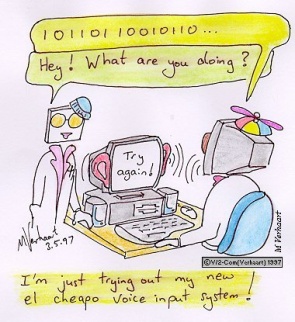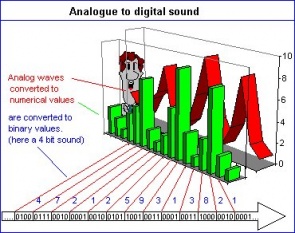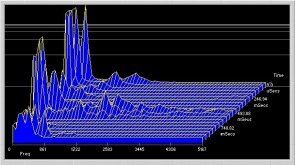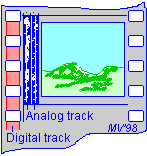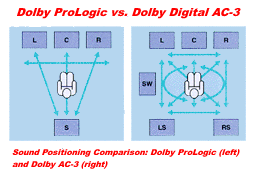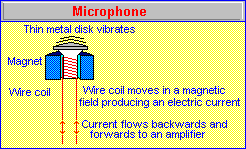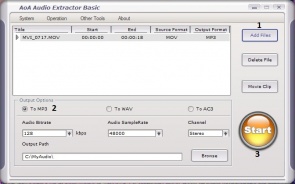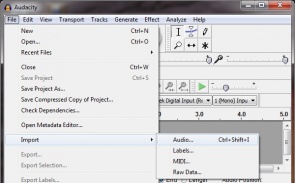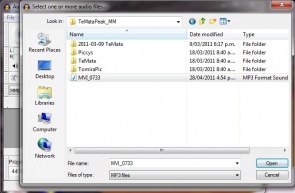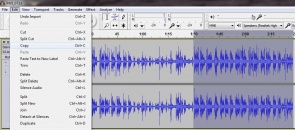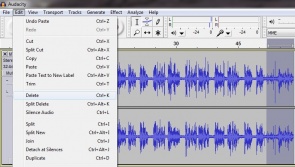VirtualMV/Multimedia/Elements/Sound(Audio)
| Multimedia Elements | ||
|---|---|---|
| Basics | Text | Graphics | Sound (Audio) | Animation | Video | | |
Multimedia Sound (Audio)
Overview
Sound is perhaps the most sensuous element of multimedia. It is meaningful "Speech" in any language from a whisper to a scream. It can provide the listening pleasure of music, the startling accent of special effects, or the ambience of a mood-setting background. How you use the power of sound can make the difference between an ordinary multimedia presentation and a professionally spectacular one (Vaughan,1993)[1].
WAV samples
Voice and music kitmm/wavef1.wav Special effects kitmm/tada.wav
wavef (165K)
{wavef :165KB:@00:00:15} Waveform sound file examples
tada (27K)
{tada :27KB:@00:00:01} Tada wave sound file
WAV: Windows Sound Recorder
Bundled software with MS-Windows
{winsoundrec}
Windows Sound Recorded
Windows Sound Recorded
MP3 samples
kitmm/wavef.mp3
Online references Mp3
- Players:
- VLC Aug 2009
- Diamond mm (Rio)- Dec 98 http://www.diamondmm.com/
- Creative Technology Nomad- May99 http://www.nomadworld.com/
- WinAmp (Player) http://winamp.lh.net/main.html
- audioexplosion (http://www.audioexplosion.com/)
- goodnoise (http://www.goodnoise.com/), mp3 (http://www.mp3.com/), , - Dec98
- musicmatch (http://www.musicmatch.com/) - Jukebox CD to wav to MP3 conversion - May99
Music
- mp3hits ( http://www.mp3shits.com ) - Sep 01
- audiofind (http://www.audiofind.com/)(song lyrics- http://www.lyrics.ch/) hot100 (http://www.hot100.com/music) - Jan99
- Schlichther, J., (2000, Mar) MPEG: avi2mpg1 & wav2mp mpeg encoders for Windows (freeware). Retrieved 14/3/2000 from http://www.mnsi.net/~jschlic1/ [21/3/1999].
wavef (180K)
Waveform sound file examples
MIDI Samples
beeth (6K)
{beeth :6KB:@00:02:27} Beethoven midi file
CuBase Audio XT
Midi recorder and editor
Midi recorder and editor - Cubase
Benefits
- Creates Mood
- Sound can create a "mood"
- Sound is perhaps the most sensuous element of multimedia.
- n4speed2 (102K)
Need for Speed CD-Rom Example
Need for Speed CD-Rom Example
- Can indicate an emotion
- Can be a whisper to a scream
mvhello (35K)
{mvhello :35KB:@00:00:03} scary wav audio file
- Can capture the emotion of an actual event
- Great speeches can be recorded
- For example
- "We will never surrender.."
- "One step for mankind.."
- Provide feedback
- For example: On a button click can provide an audio feedback
- Distribution of music
- New musicians are able to get their songs to an international audience
- Old historical songs can be recorded, collected and made available for research
- For example: NZ Digital Library ( http://www.nzdl.org )
- Enhances the Chat experience
- Chat sessions, which are usually text based can be enhanced with the addition of asynchronous (two way) sound, allowing for a web-phone.
- Used with avitars to give a sense of reality
- Used in VR to give orientation
- Sound levels can be altered to indicate the direction of an object.
- For example
- In an flight simulator the illusion of a plane flying behind you
- In a shopping mall, the direction of a music shop.
- Stimulates imagination
- Sound is capable of being used to recall events.
- For example
- The sound of a waterfall can produce memories of a camping trip
- Accessibility
- Can be used with voice recognition software for hands free data entry
- For example. http://www.research.ibm.com/tts/coredemo.html
- Voice recognition
- A computer can be taught to recognise certain words from a particular person by listening to those words and storing a voice print (fourier analysis of the harmonics) for future matching.
- This is available in MS-Office XP (in Office 2007 the Windows Vista engine is required)
- The most popular software is Dragon Dictate.
- Text to speech conversion
- The ability to have the computer read the text can be a big aid to those who cannot read the screen , or for checking lots of numbers as in a spreadsheet.
- MS-Excel has this built into the program.
{msexceltext2speech}
Microsoft excel text to speech demonstration
Properties
Analog to digital sound
Analog sound is the sounds we hear. Someone speaking, a musical instrument being played, a dog barking. It is made by vibrating waves in the air. A computer is only capable of storing digital data, so we need to convert this analog sound into digital. Using an Analog Digital Converter (ADC) sound may be digitised into your computer.
Waveform display
The ADC samples the electrical values of an analog sound wave and records them as numerical units. Most editing software display sounds in waveforms to assist editing.
Sound formats
Sound comes in a variety of formats, and within each format you can specify different settings.
- Resource Interchange File Format (RIFF)
- A Microsoft developed format capable of handling digital audio and MIDI.
- WAV (waveform)
- Developed by Microsoft as a subset of the RIFF format, comes standard with MS-Windows supporting Mono-stereo, 8 or 16-bit audio.
- Windows wave files, the standard settings (work with a PC-Speaker Driver -PCM 11,025Hz 8bit Mono)
- MPEG level 3
- An open compression standard, designed for storing digital sounds suitable for the Internet.
- SDMI (Secure Digital Music Interface)
- Standard released July 13, 1999. Designed to protect against most forms of unauthorised copying.
- SND (sound)
- Used by Apple Macintosh (with interpreters for the PC available) limited to 8 bits.
- MOV (movie)
- Used by Apple Macintosh (with interpreters for the PC available). Basically a video format where the pictures are omitted.
- Audio Interchange File Format (AIFF, AIF) Standard AIFF is a leading format (along with SDII and WAV) used by professional-level audio and video applications, and unlike the better-known lossy MP3 format, it is non-compressed (which aids rapid streaming of multiple audio files from disk to the application), and lossless.
- Used by Macintosh, IBM compatibles, Comodore Amiga & Silicon Graphics computers. Allows a large number of sampling rates up to 32 bits
- Sun Audio (AU)
- Developed by Sun Microsystems, uses a 16-bit compressed audio format.
- VOC (voice)
- Creative labs voice format for the Sound Blaster card. Supports 8-16 bits wit/without compression.
Note: Programs like Director 7 allow for internal file types. In Directors case Shockwave Audio (SWA), where a compression ratio of up to 176 to 1 is possible.
Type: WAV
- Wav is the extension used for files containing digitized analog sound using a microphone, sampler etc...
- Microsoft developed it not much after they launched windows 3.0 in 1985.
- Wav files are normally large in size depending on length, whether its recorded in stereo or mono and the sampling rate used.
- An advantage of digitizing sound is that it gives as a visual display of the file.(see diagram above).
Uses
The main use for wave is in the recording studio as it out does the need for reel to reel (analogue tape), it is a near prefect storage medium & it enables users to visually edit there sounds and copy and paste with ease. Most soundcards in today’s computers are capable of playing back and recording stereo16-bit sound sampled at 44kHz. 32 bit and 64 bit sound cards are emerging. The sample rate of 44kHz at 11kHz is relevant to the sound quality and Mb taken up per seconds
WAV: Recording options
- Channels: Mono or stereo
- Sound level - ensure all sounds are normalised
- Sampling rates:
- Voice 11kHz
- Tape Quality 22kHz
- CD Quality 44kHz.
- Sampling size:
- 8 bit = 256 steps in amplitude (sound effects),
- 16-bit (65,536 steps in amplitude (CD-quality audio)
- Windows standard:
- Mono 11KHz, 8bits
- Samples : Voice & music (Dreaming - Schumann)
- wavef.wav (324KB, PCM 22,050 Hz, 8Bit, Mono)
- wavef1.wav (162KB, PCM 11,025 Hz, 8Bit, Mono) - background sound
- wavef.mp3 (177KB, MP3 of 1 above )
wavef (165K)
{wavef :165KB:@00:00:15} Waveform sound file examples
WAV: Windows Sound Recorder
Bundled software with MS-Windows
{winsoundrec}
Windows Sound Recorded
Windows Sound Recorded
WAV: Creative Labs Wave Studio
Audio: Creative Labs Wave Studio
Type: MP3
- An open compression standard, designed for storing digital sounds suitable for the Internet.
- MP3 gives a 12:1 audio compression.
- A typical track on an audio CD takes 50MB. As an MP3 file this may be reduced to 4.5MB (making it feasible to download).
- As a general rule 1Mb equals about 1 minute of music
- The MP3 compression algorithms analyse the digital files to eliminate sounds inaudible to the human ear by running a high-pass/low-pass filter. This reduces the file size by up to 90%. The filters can be adjusted to increase the compression with a decrease in both file size and quality.
References: http://www.mp3.com
Rio Net Player:
- 32MB onboard flash memory able to store up to 60 minutes digital quality audio or several hours of voice quality audio.
- Sounds may be downloaded from the internet.
- No moving parts
- Cost approx. (1999) NZ$600
Rio Net mp3 Player (1999)
Type: WMA
- Windows Media Audio
- An mp4 sound compression (basically WMV without the video)
Type: MIDI (MIDI Musical Instrument Digital Interface)
A second way sound can be represented in digital is by recording notes. This is used extensively by electronic instruments, such as an electronic keyboard. Notice how on the electronic keyboard the instrument can be changed. The most common format is mid, but there are others such as kar (karaoke) file.
Kar file: karaoke
Kar files are midi files with synchronised text
KAR - Karaoke (midi with synchronised words) http://www.vanbasco.com
Terminology
Dolby(R) digital surround sound
First introduced in 1992 with Batman Returns.
Also known as AC3 (Audio Coding), or Dolby 5.1 (where .1 indicates subwoofer bass channel). Dolby Digital has been chosen as the standard sound technology for DVD (digital video disk) and HDTV (High definition TV).
It is a digital encoded system of 6 separate and independent surround sound channels, for 6 speakers (Front (Left/right), Rear (left/right), Front center and Sub-woofer. Since it is digital you can get no noise and so a sound engineer can place sounds exactly in each channel.
Designed for CD-ROM technology, has been placed between sprocket holes to keep film standard. The Dolby Digital soundtrack is optically encoded right on the film strip, in the space between the sproket holes. This allows it to co-exist with the analog sound track. Note that VHS tapes cannot store a Dolby Digital signal.
- Dolby Labs (May97) (http://www.dolby.com/)
- rit.edu (1998) (http://www.rit.edu/)
- Circuit City (1997) (http://circuitcity.pic.net/)
Comparing Dolby Digital to Dolby ProLogic
Features
Basic
Advanced
This list gives an example of some advanced text features and is not a complete list. Please add any that you consider advanced using the annotation feature
- Setting cue points
- Legal issues
- Copyright (both on others and your original work)
- Privacy
- Fair use
- Package recommendation (when to use and what to use)
Hardware
Microphone and sound card
A microphone is connected to a computer either via a sound card. The quality of either makes a big difference to the quality of your sound reproduction. It is generally considered that the best microphones (2004) are USB with an in-line sound card (retail for NZ$150).
MIDI
MIDI is a serial data transmission protocol for transporting musical information between compatible electronic musical devices.
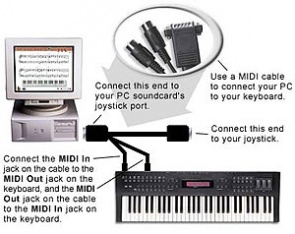
Creating and editing software
- Examples
- Waveform (wav, mp3)
- Audacity (n.d.) The Open Source, Cross-Platform Sound Editor. Retrieved May 14, 2007 from http://audacity.sourceforge.net/
- Allows multichannel editing
- Windows Sound Recorder
- Restricted to 60 seconds of sound capture
- Adobe Audition (formerly CoolEdit 2000)
- Video (sound channel only)
- Windows Movie Maker (able to save to wma)
- Quicktime (mov)
- Audacity (n.d.) The Open Source, Cross-Platform Sound Editor. Retrieved May 14, 2007 from http://audacity.sourceforge.net/
- Midi
- Cubase
- Finale
- Sibaleaus
- Waveform (wav, mp3)
Using windows sound recorder
Setting recording control In order to record on your PC you must
- Have a microphone connected and
- Set the microphone in the windows recording control
{recordingcontrol} Video showing how the windows recording control is set
To test that your computer microphone is working use windows sound recorder Select Start | Programs | Accessories Entertainment | Sound Recorder.
- Try adding some sound effects such as echo, and change the speed.
- Try speaking slowly, then speeding up the recording.
{winsoundrec} Windows Sound Recorded
Using AoA Audio Extractor
The free version of AoA Audio Extractor allows you to easily extract audio from a variety of common video files used for digital recordings. It can be downloaded from: [1]
- After opening up, click Add File, and browse to the video file you want to extract audio from.
- Select the output audio file format you want, and browse to the save folder you want.
- Click start to extract the audio from your video.
A congratulations message should then appear.
[Added by Adam (User:Roachfex) 21:51, 4 May 2011 (EDT)]
Audacity
For a comprehensive tutorial see http://wikieducator.org/Using_Audacity
Using Audacity
- Open Audacity. Go to File, then Import, then Audio
- Browse to your audio file. [Note: to import (and export) MP3 files you have to add the LAME MP3 encoder plugin to Audacity, found at [2]]
- To grab a portion of the audio file, select the portion, go to Edit, then Copy.
Now go to File, then New. Next go to Edit, then Paste.
- To remove a portion of the audio file, select the portion, go to Edit, then Delete.
- To save the new audio file, go to File, then Export.
[Added by Adam (Roachfex 21:54, 4 May 2011 (EDT))]
 References
References
- ↑ Vaughan, T (1993) Multimedia Making it Work, Audio.. , Osborne Chapter 3, p. 37
|
virtualMV | Superquick wiki guide | Please give me some feedback |
VirtualMV/Multimedia/Elements/Sound(Audio). (2025). In WikiEducator/VirtualMV wiki. Retrieved February 18, 2025, from http:https://wikieducator.org/VirtualMV/Multimedia/Elements/Sound(Audio) (zotero)
|
